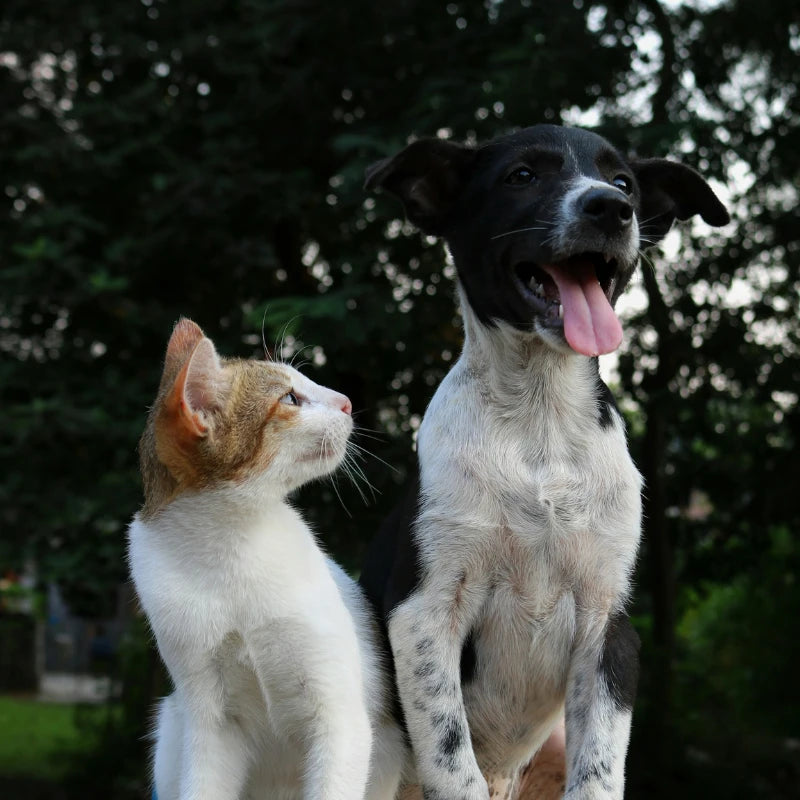Cat Suckling: Why Your Adult Cat Still Nurses & How to Stop It

Picture this: you’re lounging on the couch, petting your cat, when suddenly she starts suckling on your blanket, hoodie string, or even your finger. You pause, a little amused, a little puzzled.
“Wait—why is my grown cat acting like a nursing kitten?”
This bewildering behavior—adult cat suckling—is what we're tackling today.
What Is Cat Suckling (and Why Does It Happen)?
Cat suckling is when your feline mimics the nursing motion from kittenhood—rhythmically pressing their mouth against soft materials (or you), often while kneading and purring. It's their version of a comfort ritual, like a child with a favorite blanket.
Common targets include:
- Your skin: neck, ears, fingers, inner elbows, even armpits
-
Soft fabrics: fleece blankets, your shirt, plush toys
-
Their own paws or tails
But here's what the textbook definitions miss: For some cats, suckling isn't gentle or occasional—it's obsessive, painful, and relentless. One Reddit user described it perfectly: "He won't accept blankets. He won't accept toys. If it isn't skin, he isn't interested."
Why Do Cats Suckle?
1. Early Weaning
Many rescued or bottle-fed kittens were separated from their mothers too soon. Suckling helps them recreate that lost nursing comfort.
“My rescue kitten suckles my hoodie every night before bed — it’s his version of a pacifier.” — Reddit user
2. Comfort & Stress Relief
Suckling releases endorphins that help cats calm down. It’s often seen when they’re sleepy, relaxed, or adjusting to a new home.
“It’s like a self-soothing mechanism. She does it when she’s cozy or a bit anxious.” — Reddit user
3. Bonding & Trust
Some cats only suckle when they’re deeply bonded with their humans — it’s actually a sign that they feel safe and loved.
“My adult cat still suckles on my blanket. It’s adorable, honestly — she only does it when she’s lying on my chest.”— Reddit user
Understanding Your Cat's Suckling Type

How to Gently Manage Cat Suckling
Rule number one: Do not punish your cat. Punishment only increases anxiety, which is often the problem in the first place. Our goal is redirection and enrichment.
1. Create Safe Suckling Stations
What to provide:
-
2-3 tightly-woven fleece blankets (no loose threads)
-
A soft, sturdy stuffed animal without removable parts
-
A kitten pacifier toy designed for this behavior
Where to place them:
-
Their favorite lounging spots
-
One near your common cuddle location
-
Their sleeping area
2. Environmental Enrichment (Reduce the Need)
Mental stimulation:
-
Puzzle feeders for meals (makes eating take 20 minutes vs. 2)
-
Rotate toys weekly (keeps novelty high)
-
Food-hiding games throughout the house
Physical exhaustion:
-
2x daily interactive play sessions (morning and evening)
-
Vertical space: cat trees, wall shelves
-
Window perches with "cat TV" (bird feeders outside)
Routine consistency:
-
Same feeding times daily
-
Predictable play schedule
-
Consistent bedtime routine
Why this helps: Bored, anxious, or under-stimulated cats suckle more. A tired, mentally engaged cat has less bandwidth for obsessive behaviors.
Will This Ever End?
It’s the question every cat parent asks at some point:“How long will this go on?”
Here’s the truth — there’s no one-size-fits-all timeline. Every cat’s emotional story is different. But thanks to thousands of shared experiences online (and a lot of patience), we can see a few patterns emerge.

The Truth About Cat Suckling
Here's what I want you to remember when you're exhausted, frustrated, and covered in cat saliva: Your cat chose you as their safe person. Out of everyone in the world, YOU are the one who makes them feel secure enough to regress to kittenhood.
Yes, it's inconvenient. Yes, it can hurt. Yes, you're allowed to set boundaries.
But underneath the drool and the hickeys and even the 3 AM wake-ups is a profound compliment: You are home to them.
FAQs
1. My cat only suckles when super happy and relaxed. Is that different from stress suckling?
Yes! Happy suckling happens during contentment—your cat purrs, kneads gently, and seems blissed out. Stress suckling is compulsive, constant, and often accompanied by wide eyes or aggressive kneading.
2. Why does my boyfriend's armpit hair attract my cat?!
Two reasons: texture and scent. Armpit hair may feel similar to mom's belly fur, and that area has concentrated pheromones. Your cat is drawn to the sensory experience.
3. Will providing a pacifier or blanket make the behavior worse?
No. Providing appropriate alternatives doesn't reinforce the behavior—it redirects it. Think of it like giving a baby a pacifier vs. letting them suck their thumb. You're offering a safer option.





Leave a comment